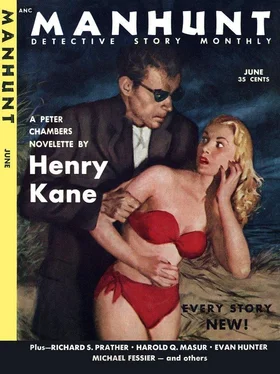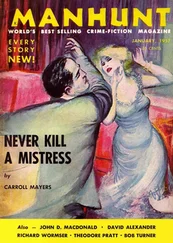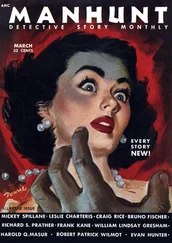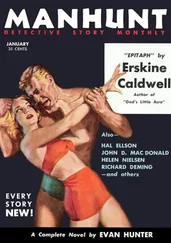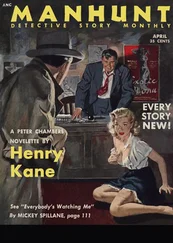Ричард Деминг - Manhunt. Volume 1, Number 6, June, 1953
Здесь есть возможность читать онлайн «Ричард Деминг - Manhunt. Volume 1, Number 6, June, 1953» весь текст электронной книги совершенно бесплатно (целиком полную версию без сокращений). В некоторых случаях можно слушать аудио, скачать через торрент в формате fb2 и присутствует краткое содержание. Город: New York, Год выпуска: 1953, Издательство: Flying Eagle Publications, Жанр: Детектив, на английском языке. Описание произведения, (предисловие) а так же отзывы посетителей доступны на портале библиотеки ЛибКат.
- Название:Manhunt. Volume 1, Number 6, June, 1953
- Автор:
- Издательство:Flying Eagle Publications
- Жанр:
- Год:1953
- Город:New York
- ISBN:нет данных
- Рейтинг книги:5 / 5. Голосов: 1
-
Избранное:Добавить в избранное
- Отзывы:
-
Ваша оценка:
- 100
- 1
- 2
- 3
- 4
- 5
Manhunt. Volume 1, Number 6, June, 1953: краткое содержание, описание и аннотация
Предлагаем к чтению аннотацию, описание, краткое содержание или предисловие (зависит от того, что написал сам автор книги «Manhunt. Volume 1, Number 6, June, 1953»). Если вы не нашли необходимую информацию о книге — напишите в комментариях, мы постараемся отыскать её.
Manhunt. Volume 1, Number 6, June, 1953 — читать онлайн бесплатно полную книгу (весь текст) целиком
Ниже представлен текст книги, разбитый по страницам. Система сохранения места последней прочитанной страницы, позволяет с удобством читать онлайн бесплатно книгу «Manhunt. Volume 1, Number 6, June, 1953», без необходимости каждый раз заново искать на чём Вы остановились. Поставьте закладку, и сможете в любой момент перейти на страницу, на которой закончили чтение.
Интервал:
Закладка:
“That shouldn't be too hard to straighten out. Where’s the phone book?”
She got off the divan and brought it to me. We stuck our heads together and looked. It was Keith Grant. There was an office and a home. It was too late for the office. I called the home. T he phone rang for a while and then a sleepy voice answered.
“Hello?”
“Mr. Grant.”
“This is he.”
I knocked my voice down a couple of notches. Lola’s ear was at the receiver with mine. I said, “This is Mr. Palance.”
“Frank?”
“No. Frank’s father. Ben Palance.”
“Yes, Mr. Palance?”
“Sorry to disturb you so late.”
“That’s all right, sir.”
“It’s about Frank’s policy, Mr. Grant. He talked about a change in beneficiary, the day he sailed. Something about a young lady, Rose Jonas.”
“Yes, sir,” he said. “Change of beneficiary. He was in touch. Those were his instructions. Yes, sir. Rose Jonas.”
“Thanks,” I said, and hung up.
Lola said, “See?”
Glumly I said, “I see.” I got to my feet.
“Where you going?” she said.
“Work.”
7.
The Raven was more lull of noise than a filibustering Senator. The act on stage was Rose Jonas singing Stardust. I had heard better, but I hadn’t seen much better. She was put together like she was comfortable in bed, the naked part top-heavy, the rest of her, in no underwear, encased in a tight black sequinned gown. She had black hair, pulled around exposing one small ear, the rest of it in black curls over one shoulder. She had black enormous spread-apart eyes, hollows in her smooth dark cheeks, and a loose red passionate mouth. She sold sex right off the floor, every bulge of her visible under the baby spot. I couldn’t much have blamed Frank Palance.
I found Tom Connors. I said, “I’d like to wait for gorgeous in her dressing room.”
“Trouble?”
“Possibly. I hope not.”
“Come on.”
The dressing room was like every dressing room in every trap. A tumbled room with the sweet smell of cold cream and the triple-mirrored table with the lights. I smoked and waited and then she came. She saw me but she didn’t say a word. She picked up a pack of long brown Shermans, lit one, drew heavy and smoked fast. She said, “What are you doing here?” She had a slow deep voice.
I said, “Frank sent me.”
“Who?”
“Frank Palance.”
“Who’re you?”
“Pete.”
“Pete who?”
“Just Pete.”
“Frank sent you. For what?”
“I’m supposed to deliver a message.”
“So okay. Deliver it.”
“He’s dead.”
The brown cigarette stopped halfway up. The black eyes squinted. A red tongue came out of the big red mouth and wet the lower lip and stayed there. Then she said, “You want to talk?”
“Yep.”
“Well, this ain’t no place to talk. Let’s get out of here.”
“I’m with you, Rosie.”
She killed the cigarette. She changed her dress. She slung a mink jacket over her shoulders, picked up a handbag out of a drawer, said, “Come on, Buster.”
We went. By cab. To a tenement on the Lower Fast Side. Allen near Rivington, a ramshackle building that hadn’t been painted in thirty years, the kind with the toilets in the halls. We went through a lobby that stank of ancient rats, turned right, and she stuck a key in the door. She made a lot of noise doing it. She opened the door and we went in. I went first.
It was a dirty old room, part kitchen, part parlor, with a couple of dirty old doors loose-hinged at the far wall. The only modern touch was a telephone stuck on top of a peeling, vibrating refrigerator. I turned to Rose.
Rose had a gun in her hand.
A competent little automatic.
It fit her.
She said, “You wanted to talk. Talk.” She shook out of the jacket and let it fall to the door. She dropped her open handbag on top of that.
“Frank’s dead,” I said.
“How do you know?”
“I saw it in the papers.”
“That’s a lie,” she said. “It happened too late for the morning papers. It won’t hit till tomorrow afternoon.”
I said, “How do you know?”
She smiled. Then the smooth, thick red tongue flicked out again. She looked past me, at one of the doors. She called, “Whisper. Mosey out.”
The door opened and a short fat man came through. He wore pants, nothing else. His belly came up to his chest, covered with hair. His feet were bare and dirty. His eyes were lost in the fat of his face, gleaming like an animal’s, and the gleam was sharper, devouring, more like an animal, when he looked at Rose Jonas.
“Hello, Rosie,” he said. “That’s a cute dress. Is it a new one? I like that dress.”
He said nothing about me, or the gun in her hand, but what he said was said in the buzz-saw voice that was more identification than fingerprints.
She pointed the gun at me. “Ever see this guy?”
Reluctantly, he moved his eyes off her, peered at me and smiled, one front tooth missing. His nose wrinkled. “Sure. He was one of them there, down by Frank’s.”
She came near me. “What's your name?”
“Pete.”
“You told me that. Who are you?”
“Nobody.”
“Open your jacket.”
I opened my jacket. She put her free hand in, searching for identification. I was sorry before I did it. It was like taking taffy from an octogenarian. I grabbed for the gun with my left, and jolted my right fist to her chin. She fell in a snoring heap on the mink jacket. Whisper may have had marbles in his head but every little marble understood the gun in my hand.
“Don’t do nothing rash,” he said. “Don’t do nothing rash, fella.”
“Nothing rash,” I said. “Except maybe spray some of your brains on the floor.”
“Cut that out, mister. Please. Don’t talk like that.”
“Who do you work for?”
“Now, look, mister—”
“You look, pal. You killed a guy tonight. Remember?”
“That ain’t for you to say.”
“Ain’t for me to say?”
“I’m entitled to a judge, and a jury, and a lawyer.”
“Look,” I said, “I want information. You’re not the smartest guy in the world. You’re the guy that shoots a bullet into a wall just to let us know you’ve got a gun, and two minutes later you’re telling a guy not to talk too loud. But try to understand this. Try hard. Either I get information, or you get lead. It happens to guys... resisting arrest.”
“Cop?”
“Private. Okay. The nickel’s in the slot. Let’s have the music.”
“I work for Joe April.”
“How long?”
“A couple of months.”
“You from the Coast?”
“No.” His voice lowered.
“Where?”
“Detroit.”
“What’s April’s racket?”
“I don’t know.”
I didn’t think he was telling the truth, but I wasn’t pressing. I said, “Where’s headquarters?”
“Flamingo Garage. Thirty-first and Ninth.”
“All right. Now where’s your heater?”
He pointed at the open door. “In the bedroom. In the rig.”
“Move.”
I walked with him into the filthy bedroom. His holster was caught around the brass bed-post of an old bed. I took his revolver out and marched him back to the kitchen. I said, “Sit down.”
He sat.
Rose kept snoring on the floor.
I said, “What’s your real name?”
With dignity he said, “Roderick H. Dallas.”
I went to the refrigerator and for the second time that night I called cops, this time Detective-Lieutenant Louis Parker in particular. Rose Jonas was still snoring when the sirens sounded in the street.
8.
I worked it out with Parker. It took a lot of coaxing, but I worked it out. It was a way of pushing through, right to the bottom, quick and with one shove. And it might work. It was better than a raid, and the onslaught of shysters with writs of habeus corpus. And I didn't know these guys, and they didn’t figure to know me. It took a lot of coaxing, but Parker was all cop, and he was keen enough to know it might work, it might push through, all the way, with one shove.
Читать дальшеИнтервал:
Закладка:
Похожие книги на «Manhunt. Volume 1, Number 6, June, 1953»
Представляем Вашему вниманию похожие книги на «Manhunt. Volume 1, Number 6, June, 1953» списком для выбора. Мы отобрали схожую по названию и смыслу литературу в надежде предоставить читателям больше вариантов отыскать новые, интересные, ещё непрочитанные произведения.
Обсуждение, отзывы о книге «Manhunt. Volume 1, Number 6, June, 1953» и просто собственные мнения читателей. Оставьте ваши комментарии, напишите, что Вы думаете о произведении, его смысле или главных героях. Укажите что конкретно понравилось, а что нет, и почему Вы так считаете.
